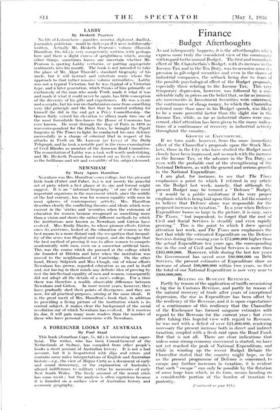NEWNHAM'
By Mary Agnes Hamilton Newnham was Mrs. Hamilton's own college, but this pleasant little book (Faber and Faber, 5s.) is nat merely the graceful act of piety which a first glance at its size and format might suggest. It is an " informal biography '• of one of the most important organisms in the movement which, since the middle of the last century, has won for women equality with men in most spheres of contemporary activity. Mrs. Hamilton describes clearly the conflicting theories and ideals which were current in the 'sixties and 'seventies when the extension of education for women became recognised as something more than a vision and shosh the rather different methods by which the institutions now known as Newnhath and Girton have evolved. Miss Emily Davies, to whose pioneer efforts Girton owes its existence, looked at the education of women as the best means to a more distant end, the recognition that inequal- ity of the sexes was illogical and unjust. and she thought that the best method of proving it was to allow women to compete academically with men, even on a somewhat artificial basis. This was the course which she pursued at the college which she founded at Hitchin and later when the institution was moved to the neighbourhood of Cambridge. On the other hand, Henry Sidgwick and Miss Clough, out of whose efforts Newnham has 'grOwn, regarded education as an end in itself and, not having in their minds any definite idea of proving by test the intellectual equality of men and women, consequently did not adopt all the details of a men's college. For a time there was therefore a readily observable difference between. Newnham and Girton. In more recent years, however, they have gradually shed their points of divergence, and they are now, for all practical purposes, aiming at the same ideals. It is the great merit of Mrs. Hamilton's book that, in addition to providing a living picture of the institution which is its central subject, it makes clear the background of the social revolution out of which Newnham has evolved. If it receives its due, it will gain many more readers than the number of those who have personal connexions with New-ninon.














































 Previous page
Previous page